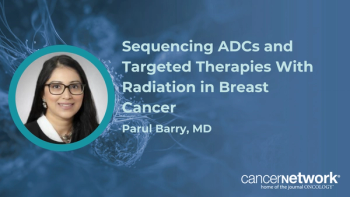
Oncology NEWS International
- Oncology NEWS International Vol 10 No 4
- Volume 10
- Issue 4
Gene-Expression Profiles Identify BRCA1,2 Breast Cancers
BETHESDA, Md-A study of breast cancer patients with hereditary BRCA1 and BRCA2 mutations or sporadic cancers has shown a distinctive gene-expression profile for each type of breast cancer gene mutation and also revealed an unanticipated finding-a patient with a nonhereditary BRCA1 mutation.
BETHESDA, MdA study of breast cancer patients with hereditary BRCA1 and BRCA2 mutations or sporadic cancers has shown a distinctive gene-expression profile for each type of breast cancer gene mutation and also revealed an unanticipated findinga patient with a nonhereditary BRCA1 mutation.
The study, from the National Human Genome Research Institute (NHGRI), looked at RNA from 22 samples of primary breast cancers from seven carriers of the BRCA1 mutation, seven carriers of the BRCA2 mutation (eight samples), and seven sporadic cases. Gene activity in each sample was measured using a microarray of 6,512 complementary DNA (cDNA) clones of 5,361 genes, to look for distinctive gene-expression profiles.
The researchers identified 176 genes that were differentially expressed in tumors with BRCA1 mutations and BRCA2 mutations, 51 of which were found to best differentiate between the two types of cancer (NEJM 344:539-548, 2001).
"This powerful new technology gives us a snapshot of exactly which genes are active in a tumor cell," said lead author Dr. Jeffrey Trent, NHGRI’s scientific director. "Over the last few decades, scientists have made important progress in understanding the molecular origins of cancer by studying one gene at a time. Now we can look at thousands, and even tens of thousands, of genes as they interact to produce a tumor. This capability will have important implications for both diagnosis and treatment."
The BRCA2-mutation gene-expression profile proved less accurate than that for BRCA1 mutations. Using a class-prediction method, the BRCA1-mutation profile correctly identified all 7 tumors with BRCA1 mutations and 14 of 15 tumors without BRCA1 mutations. The BRCA2-mutation gene profile correctly identified 5 of 8 tumors with BRCA2 mutations and 13 of 14 tumors without BRCA2 mutations.
In the one tumor (from a patient with sporadic breast cancer) misclassified by the profile as being positive for a BRCA1 mutation, the researchers noted a markedly reduced level of BRCA1 expression, compared with the six other sporadic breast cancers in the study. Further testing showed that the misclassified tumor was the only sporadic tumor with hyper-methylation of the BRCA1 promoter region, indicative of the inactivation, or "silencing," of BRCA1.
Scientists at Johns Hopkins Oncology Center had previously shown that aberrant methylation silences the BRCA1 gene in sporadic breast and ovarian cancers with no BRCA1 mutation (J Natl Cancer Inst 92:564-569, 2000). Further, they found that BRCA1 promoter hyperme-thylation is more frequent in the medullary and mucinous subtypes of breast carcinoma, similar to the histologic distribution seen in BRCA1 germline mutation carriers.
In a media advisory, Manel Esteller, MD, PhD, of the Division of Tumor Biology at Hopkins and a coauthor of the NHGRI study, explained that "normal methylation allows the gene to function normally, but when the gene is hyper-methylated, it turns off, inhibiting tumor-suppressing activities and leading to the initiation of cancer."
In the Hopkins study, about 15% of sporadic breast cancers and about 20% of sporadic ovarian cancers had BRCA1 promoter hypermethylation. "There are going to be far more patients with sporadic breast cancers with BRCA1 inactivated with promoter hypermethylation than patients who have such tumors on an inherited basis secondary to germline BRCA1 mutations," Stephen Baylin, MD, Ludwig Professor of Oncology at Hopkins, told ONI.
Dr. Baylin said that a test that would allow physicians to differentiate between those tumors resulting from inherited BRCA1 mutations and those caused by noninherited abnormal methylation of the gene is in development.
"Such a test would give patients the ability to determine if their cancer occurred as the result of an inherited mutation that could affect other family members or randomly with no familial link," Dr. Baylin said. However, he cautioned that the test is in the very early stages of development.
Dr. Baylin, James Herman, MD, assistant professor of oncology at Hopkins, and their research team have been studying the effect of abnormal methylation patterns on cancer-related genes for more than a decade and have linked it to a variety of cancers, including colon, lung, brain, and head and neck tumors.
Articles in this issue
almost 25 years ago
IOM Urges Action to Fix ‘Broken’ US Health Care Systemalmost 25 years ago
Thompson Pledges Fundamental HCFA Reformalmost 25 years ago
NCCN Updates Its Practice Guideline for Breast Canceralmost 25 years ago
Smoking Prevalence, Mortality Ranges Widely From State to Statealmost 25 years ago
NCI Debuts New Program for Cancer Advocatesalmost 25 years ago
Fiberoptic Ductoscopy for Nipple Discharge DisWomen With Nipple Dischargealmost 25 years ago
Augmerosen, Antisense Drug, in Phase III Testing in Melanomaalmost 25 years ago
Automated System Improves Accuracy of HER-2 Scoringalmost 25 years ago
Small Advantage for Adjuvant Paclitaxel in Early Breast CancerNewsletter
Stay up to date on recent advances in the multidisciplinary approach to cancer.










































